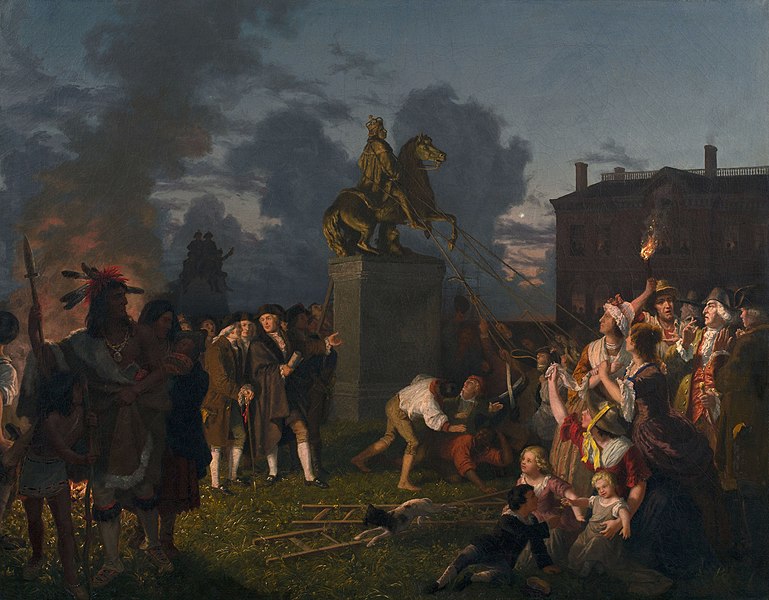emptitious
adj. susceptible to bribery
chantage
n. extortion; blackmail
luition
n. payment of a ransom
quomodocunquizing
adj. that makes money in any possible way
emptitious
adj. susceptible to bribery
chantage
n. extortion; blackmail
luition
n. payment of a ransom
quomodocunquizing
adj. that makes money in any possible way

The Boston Gazette published this cleverly seditious “Enigmatical Ballad” on June 24, 1782. If each line is read in full, the poem supports British rule of the American colonies, but if either the italic or the roman text is read alone, then it advocates revolution:
I justify every part, of King and Parliament,
Of a whig with all my heart, I hate their cursed intent;
For to support I’ll try, friends of administration,
Friends of Liberty, are troubles to the nation;
I think the association, a cruel, base intent,
An honor to the nation, the act of Parliament,
I wish the best success, to North and his conclusion,
Unto the grand Congress, the worst of all confusion;
All luck beneath the sun, to Mansfield, Bute and North;
To General Washington, destruction and so forth,
Hark! Hark! the trumpet sounds, the din of war’s alarms,
O’er seas and solid ground, doth call us all to arms;
Who for King George doth stand, their honors soon will shine;
Their ruin is at hand, who with the Congress join;
The acts of Parliament, in them I much delight;
I hate their cursed intent, who for the Congress fight,
The Tories of the day, they are my daily toast;
They soon will sneak away, who independence boast,
Who non-resistance hold, they have my hand and heart;
May they for slaves be sold, who act a whiggish part;
On Mansfield, North and Bute, may daily blessings pour,
Confusion and dispute, on Congress evermore;
To North, that British Lord, may honors still be done;
I wish a block or cord, to General Washington.
Peculiarly British limericks:
There was a young fellow of Beaulieu,
Who loved a fair maiden most treaulieu.
He said, “Do be mine,”
And she didn’t decline,
So the wedding was solemnized deaulieu.
There was a young maid of Aberystwyth,
Who took corn to the mill to make grystwyth,
The miller, named Jack,
With a pat on her back,
Pressed his own to the lips that she kystwyth.
There was a mechalnwick of Alnwick,
Whose opinions were anti-Germalnwick;
So when war had begun,
He went off with a gun
The proportions of which were Titalnwick.
There was a young lady of Slough,
Who went for a ride on a cough.
The brute pitched her off
When she started to coff;
She ne’er rides on such animals nough. (Langford Reed)
A bald-headed judge called Beauclerk
Fell in love with a maiden seau ferk
Residing at Bicester,
Who said when he kicester,
“I won’t wed a man without herk.”
See This Sceptred Isle and Sound Rhymes.
surbate
v. to make one’s feet sore
There’s a little old fellow and he has a little paintpot,
And a paucity of brushes is something that he ain’t got,
And when he sees a road sign, the road sign he betters,
And expresses of himself by eliminating letters.
Thus THROUGH ROAD
Becomes ROUGH ROAD
And CURVES DANGEROUS
Is transformed to CURVES ANGER US
And 24-HOUR SERVICE
Turns into 24-HOUR VICE
And MEN AT WORK IN ENTRANCE
Is reduced to MEN AT WORK IN TRANCE
An SLOW DOWN BRIDGE ONE WAY
Is triumphantly condensed to
LOW DOWN BRIDE ON WAY
But the old fellow feels a slight dissatisfaction
With the uninspiring process of pure subtraction.
The evidence would indicate he’s taken as his mission
The improvement of the road signs by the process of addition.
Thus TRAFFIC LIGHT AHEAD
Becomes TRAFFIC SLIGHT AHEAD
And GAS AND OIL
Is improved to GASP AND BOIL
And simple REST ROOMS
Appear as QUEEREST ROOMS
And UNDERPASS ONE WAY
Emerges as UNDERPASS GONE AWAY
And (perhaps his masterpiece)
RIGHT
EAST BOUND
TUNNEL
Is elaborated to
FRIGHTENED
BEASTS ABOUND
IN TUNNEL
Thus we see the critical mood
Becomes the creative attitude.
— Morris Bishop

tsundoku
n. the practice of acquiring reading materials but letting them pile up in one’s home without reading them
Quoth I to me, “A chant royal I’ll dite,
With much ado of words long laid away,
And make windsuckers of the bards who cite
The sloomy phrases of the present day.
My song, though it encompass but a page,
Will man illume from April bud till snow —
A song all merry-sorry, con and pro.”
(I would have pulled it off, too, given time,
Except for one small catch that didn’t show:
Forgotten words are mighty hard to rhyme.)
Ah, hadavist, in younghede, when from night
There dawned abluscent some fair morn in May
(The word for dawning, ‘sparrowfart,’ won’t quite
Work in here) — hadavist, I say,
That I would ever by stoopgallant age
Be shabbed, adushed, pitchkettled, suggiled so,
I’d not have been so redmod! Could I know? —
One scantling piece of outwit’s all that I’m
Still sure of, after all this catch-and-throw:
Forgotten words are mighty hard to rhyme.
In younghede ne’er a thrip gave I for blight
Of cark or ribble; I was ycore, gay;
I matched boonfellows hum for hum, each wight
By eelpots aimcried, till we’d swerve and sway,
Turngiddy. Blashy ale could not assuage
My thirst, nor kill-priest, even. No Lothario
Could overpass me on Poplolly Row.
A fairhead who eyebit me in my prime
Soon shared my donge. (The meaning’s clear, although
Forgotten words are mighty hard to rhyme.)
Fair draggle-tails once spurred my appetite;
Then walking morts and drossels shared my play.
Bedswerver, smellsmock, housebreak was I hight —
Poop-noddy at poop-noddy. Now I pray
That other fonkins reach safe anchorage —
Find bellibone, straight-fingered, to bestow
True love, till truehead in their own hearts grow.
Still, umbecasting friends who scrowward climb,
I’m swerked by mubblefubbles. Wit grows slow;
Forgotten words are mighty hard to rhyme.
Dim on the wong at cockshut falls the light;
Birds’ sleepy croodles cease. Not long to stay …
Once nesh as open-tide, I now affright;
I’m lennow, spittle-ready — samdead clay,
One clutched bell-penny left of all my wage.
Acclumsied now, I dare no more the scrow,
But look downsteepy to the Pit below.
Ah, hadavist! … Yet silly is the chime;
Such squiddle is no longer apropos.
Forgotten words are mighty hard to rhyme.
— Willard R. Espy
1/3rd of an inch is a BARLEYCORN.
1/12th of an inch is a LINE.
1/72nd of an inch is a POINT.
1/100th of an inch is a GRY.
1/144th of an inch is a SECOND.
1/1000th of an inch is a THOU.
1/1440th of an inch is a TWIP.
Via Haggard Hawks. Pleasingly, you can interconvert most of these here.
In the 1960s, linguist Robert M.W. Dixon met Albert Bennett, one of the last native speakers of Mbabaram, a vanishing Australian Aboriginal language of north Queensland. “You know what we call ‘dog’?” Bennett said to him. “We call it dog.”
“My heart sank,” Dixon wrote. “He’d pronounced it just like the English word, except that the final g was forcefully released.” He worried that Bennett’s decades of using English had tainted his understanding of Mbabaram.
But Bennett’s assertion was accurate: The Mbabaram word for dog is dúg, which is pronounced nearly identically to the English word, “a one in a million accidental similarity of form and meaning in two unrelated languages,” Dixon wrote.
“It was because this was such an interesting coincidence, that Albert Bennett had thought of it as the first word to give me.”
(Robert M.W. Dixon, Searching for Aboriginal Languages: Memoirs of a Field Worker, 1984.)
astriferous
adj. bearing or containing stars; starry
stelliferous
adj. filled with stars; starry